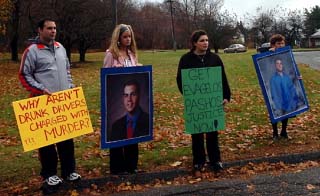 BOSTON: "Why aren't drunk drivers charged with murder?" read a sign carried by family members of slain Suffolk University student Evagelos Pashos, 21, of Shrewsbury, near Boston. The family and friends expressed their grief and outrage at the court hearing for the accused driver, who collided head on with Pashos' car, fatally injuring the student. The accused, 47-year old Alison Voorhis, was charged with vehicular manslaughter. Source. The family's noisy demonstration at the court hearing -- they packed the courtroom and vented their grief and anger at the defendant -- speaks to growing frustration with the relatively lenient treatment given to people who kill people with cars while under the influence, compared to other types of homicide.
BOSTON: "Why aren't drunk drivers charged with murder?" read a sign carried by family members of slain Suffolk University student Evagelos Pashos, 21, of Shrewsbury, near Boston. The family and friends expressed their grief and outrage at the court hearing for the accused driver, who collided head on with Pashos' car, fatally injuring the student. The accused, 47-year old Alison Voorhis, was charged with vehicular manslaughter. Source. The family's noisy demonstration at the court hearing -- they packed the courtroom and vented their grief and anger at the defendant -- speaks to growing frustration with the relatively lenient treatment given to people who kill people with cars while under the influence, compared to other types of homicide.
The world needs new models of recovery from addiction to alcohol and other drugs. This blog is my classroom, where I learn about the many issues involved in addiction and recovery. You're welcome to look over my shoulder as I learn, and to enter your comments.
Monday, November 13, 2006
Family voices outrage over drunk car killer
 BOSTON: "Why aren't drunk drivers charged with murder?" read a sign carried by family members of slain Suffolk University student Evagelos Pashos, 21, of Shrewsbury, near Boston. The family and friends expressed their grief and outrage at the court hearing for the accused driver, who collided head on with Pashos' car, fatally injuring the student. The accused, 47-year old Alison Voorhis, was charged with vehicular manslaughter. Source. The family's noisy demonstration at the court hearing -- they packed the courtroom and vented their grief and anger at the defendant -- speaks to growing frustration with the relatively lenient treatment given to people who kill people with cars while under the influence, compared to other types of homicide.
BOSTON: "Why aren't drunk drivers charged with murder?" read a sign carried by family members of slain Suffolk University student Evagelos Pashos, 21, of Shrewsbury, near Boston. The family and friends expressed their grief and outrage at the court hearing for the accused driver, who collided head on with Pashos' car, fatally injuring the student. The accused, 47-year old Alison Voorhis, was charged with vehicular manslaughter. Source. The family's noisy demonstration at the court hearing -- they packed the courtroom and vented their grief and anger at the defendant -- speaks to growing frustration with the relatively lenient treatment given to people who kill people with cars while under the influence, compared to other types of homicide.
Subscribe to:
Post Comments (Atom)
1 comment:
The legal distinction here comes down to intent. Murder requires a specific intent to harm or kill. 'Accidental' death (in quotes because such deaths are often preventable) is manslaughter. If someone runs down their ex-wife intentionally and kills her, then that indeed would likely be prosecuted as Murder. A drunk driver who hits a pedestrian would likely be charged with vehicular manslaughter (similar to someone responsible for an unintentional death that was non-driving-related). It's still a very serious charge, with significant legal, civil, and intangible, life-long penalties, but less than a charge of murder to be sure. Of course, in all cases, a victim is just as dead, a family just as impacted. Nontheless, for better or worse, our justice system considers the intent of the perpetrator a crucial part of the crime.
Post a Comment